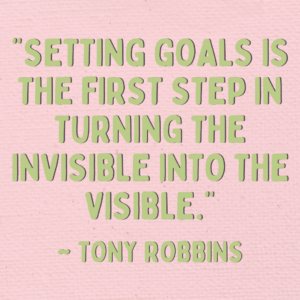Goal setting is key to our success.
We all know that setting goals is important. In the United States, it’s emphasized in our education from the day that we start kindergarten. Goal setting is crucial in many areas of our lives, but it is especially important in personal finance. It is the only real way to determine what we are working toward, and why we are working toward it. In today’s blog, we are going to be discussing the benefits of goal setting, how you can apply goals in your life, and what goals you might want to set for your personal finance journey! That way, we can all begin our journeys to a fruitful financial life.
So, we know goal setting is important. But why exactly is it so important?
There are so many great reasons to set and work towards goals. According to this article from Forbes, goal setting increases productivity and allows for the building of self-confidence. The article dives deeper into these feats, emphasizing how this is done. It argues that setting clear goals also allows you to take action in the matters that you care about and stay the course until you accomplish what you set out to do. The article also says that setting goals allows us to discover more about ourselves, since the goals that we set reflect our innermost desires. Achieving goals also allows us to learn more about ourselves: how we operate, how we respond to certain situations, and how we prefer to get things done. Finally, the article also states that achieving goals can be addicting, and thus creates more productivity. With goal setting, we are much more fulfilled, and we get our work done better. It’s clearly the best way to create an action plan for what we’d like to do.
Okay, yeah, they seem pretty important. But will any goal do the trick?
The simple answer is no. I mean, I would love to someday have a million dollars. You could say that statement alone is a goal, but it’s not going to be effective. It’s vague, probably not attainable (at least for a few decades), and there is no timeline whatsoever. If you’re setting goals like these, they’re probably not going to work for you. Instead, we should be setting SMART goals.
What are SMART goals?
You’ve probably heard this phrase before, and you might even hate me a little bit for repeating it! However, SMART goals truly are the way to go when setting goals, especially in the case of personal finance. SMART is a fancy acronym, so I’ll break it down for you. According to Eastern Washington University, SMART goals are:
- Specific
- Measurable
- Attainable
- Relevant
- Time-Based
With this in mind, it’s clear that my desire to someday have a million dollars doesn’t meet the standards of a SMART goal. We can easily change the wording and add a few details so that it might, though! Let’s do it.
How could I obtain a million dollars?
The first step in creating a SMART goal is to make it specific. Essentially, I will need to detail exactly how I plan on accomplishing my million dollar feat, and what needs to happen in order for me to get there. The statement for this part of the goal might look something like this: “I would like to have $1 million by the time I am sixty years old. I will achieve this by retaining a high savings rate, investing my savings, and living below my means.” My next step in creating a SMART goal is to make it measurable. Luckily for me, my goal is a numeric value, so it is extremely measurable. I will know my goal is met when I have a million dollars even. Following this, our goals must be attainable. Is my goal attainable? One could argue that it might be, with enough income and hard work! It’s definitely not impossible. The goal must also be relevant, and I would say that it is. I would love to be as financially free as possible, since the idea of being financially burdened is highly stressful to me. Finally, the goal must be time based. Since I added that I want to accomplish this goal before I am sixty, there is a time constraint! This allows me to devise a plan more effectively.
Cool! That sounds easy enough. There’s just one thing – I’m not really sure what goals I should be setting for my personal finance journey. What would you recommend?
This is entirely up to you and based on the stage of life that you’re at! As for me, I’m a college student, so I’m just trying to get my bearings. Right now, I am prioritizing my goal of having $1000 in my emergency fund by the time I turn twenty-two. I’ve just recently started saving for this goal, and I turn twenty-two in July! This was the most attainable way I could think of to reach this goal. My next goal will involve my student debt, which I would like to pay off completely by 2025. If you don’t have an emergency fund, you could make creating one a goal! Do you have student debt or credit card debt? You could choose to work toward paying this off as well. If you want to purchase a car or a house, you could work toward a down payment! Your goals are for you. Envision your life. What do you want it to look like? Try to set goals that will help you get there.
That’s all she wrote, folks!
Thank you so much for reading! Did you like this blog? Follow Belle In Full Bloom on Instagram, Facebook, and TikTok to get more content like this around the clock! Have a question? Submit it here. Got advice you’re dying to share? Drop us a line right here! We’re so happy you joined us today.

